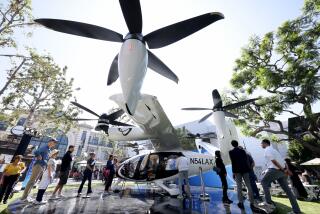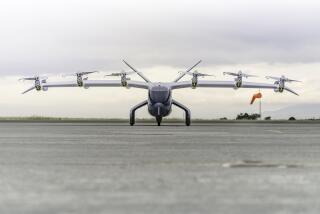Air Taxi Service for Executives : NetAir Capitalizes on ‘Time Is Money’
- Share via
NEW YORK — Almost any corporate executive can get a limo just by snapping his fingers. Now, it’s not much harder to hail an airplane.
NetAir International Corp., which describes itself as a “national on-demand executive air transportation company,” dispatches its planes from a dozen flight centers in such cities as Van Nuys, Denver, Phoenix, San Francisco, New York and Washington.
As might be expected, using one of NetAir’s planes is not cheap. But its founders maintain that, for the busy executive, time is too expensive to be wasted.
By calling (800) NETAIR-1, one can arrange in most cases to be picked up by a private taxi plane within an hour.
It costs between $2.50 and $3.50 a mile to rent a NetAir plane. That includes fuel, landing fees and crew pay. A flight from Denver to New York and back, for example, would cost about $10,000.
Customers get a free hour on the ground for every hour they have flown, but any time over that runs $50 an hour. An overnight stay costs between $300 and $500.
Brainchild of Los Angeles Lawyer
NetAir has 74 business jets and turboprops at its disposal, including Learjets, Citations and Gulfstreams. Most of them carry seven to 12 passengers.
The fledgling company, which is headquartered in Denver and began flying last April 1, is the brainchild of Jonathan Rosenthal, a 30-year-old Los Angeles lawyer who began hanging around airports when he was 15 and got his pilot’s license at 16.
Former astronaut Wally Schirra is the company’s vice president for quality control. Directors include former New York City Mayor John V. Lindsay, former Colorado Atty. Gen. John D. MacFarlane, who is now manager of safety of the city and county of Denver, and Linden Blue, former president of Beech Aircraft Corp.
Rosenthal feels that there is a real need for the services provided by NetAir, a need largely created by airline deregulation. A void, he maintains, resulted when the bigger airlines, in the deregulated environment, began moving large numbers of people between hubs in major cities and when smaller commuter airlines, often known as feeders, began carrying passengers from outlying areas to the hubs of their bigger brothers.
The result: It was almost impossible to travel between cities without going through a hub. Traveling became more time-consuming and more trouble.
“Clearly, the upper-level businessman was disenfranchised,” Rosenthal said in an interview here. “Our theory was that there was going to be greater and greater dependence on alternative means of transportation.”
For the executive, he said, “the need to get there outweighs the cost.”
Rosenthal conceded that NetAir has plenty of competition from airplane charter firms and from jets owned by large companies. But he says NetAir is the only nationwide “air taxi” system.
The firm hopes ultimately to have 25 to 30 flight centers, and Rosenthal said that, when the network is complete, every major city in the continental United States will be within an hour’s flight time (400 miles) of one of the flight centers.
Until the 1940s, he said, the automobile rental business was highly fragmented. Then along came Hertz and Avis. Customers knew they would find the same car for about the same price anywhere in the United States. NetAir is trying to follow that pattern, its president said.
But NetAir is different in that it actually owns no planes. The operating entity in each city is an independently owned charter airline that is granted a franchise by NetAir.
Some of the airplanes that NetAir uses are individually owned, usually by corporations seeking to cut overhead on under-utilized planes.
When the planes are on NetAir flights, on-board accessories like cups and napkins have the company’s logo on them and flight personnel wear NetAir uniforms. Like most corporate planes, the aircraft themselves bear no identifying logo.
NetAir makes its money by buying the flight time for one price from whoever owns the plane and selling it at a higher price.
“We are a classic retailer,” Rosenthal says. “We buy the product at the wholesale rate and we sell it at retail.” The markup is between 10% and 15%.
Business has been fairly brisk, but NetAir is still in the red even though it produced revenue of $250,000 during its first 10 months in operation. Its shares are traded on the over-the-counter market.
Passengers have included former President Jimmy Carter and the late actor Richard Burton.
Recently, “Miami Vice” star Don Johnson finished filming in Florida late on a Saturday night. He had to be in Burbank for an appearance at the NBC studios the next morning and had to be back in Miami that afternoon.
A NetAir plane out of the Fort Lauderdale flight center was hired. It flew Johnson to Southern California, waited for him and took him back to Florida.
TV News Departments
The cost was $14,000, Rosenthal said, half what it would have been if NBC had sent a chartered plane from California, as it originally intended. That plane would have had to make two round trips.
Television network news departments also are customers. Last August, an ABC news crew had to fly quickly from Denver to Cheyenne, Wyo., to cover some floods. The plane waited and took them back to Denver, and the taped photos made the evening news.
“Time is of the essence in our business,” said David Green, ABC’s Denver bureau manager. “When we’ve needed them, they’ve been ready.”
More to Read
Inside the business of entertainment
The Wide Shot brings you news, analysis and insights on everything from streaming wars to production — and what it all means for the future.
You may occasionally receive promotional content from the Los Angeles Times.










